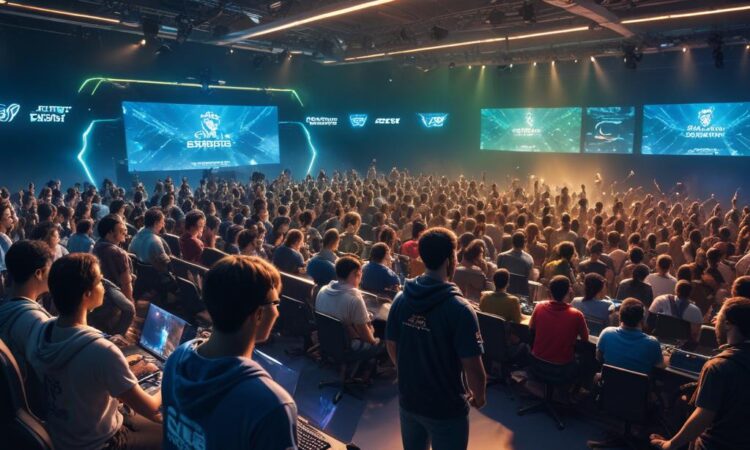Esports and Sustainability: Investigating the Environmental Impact, Exploring Initiatives, and Promoting Sustainable Practices
The world of esports, a rapidly growing industry captivating millions of viewers and players, is increasingly confronting its environmental footprint. As the digital realm of competitive gaming expands, so too does the energy consumption associated with streaming, data centers, and the production of gaming hardware. This raises pressing questions about the industry’s sustainability and the need for responsible practices to mitigate its environmental impact.
The Environmental Footprint of Esports: A Multifaceted Challenge
Esports, while seemingly a virtual activity, relies on a complex infrastructure that consumes significant resources. The energy required to power data centers, host live streams, and manufacture gaming hardware contributes to greenhouse gas emissions and exacerbates environmental challenges. Additionally, the carbon footprint of players traveling to tournaments and events adds to the industry’s environmental impact.
Data Centers: Powering the Gaming Ecosystem
Data centers, the backbone of online gaming, consume immense amounts of electricity to process and store vast amounts of data. The energy demands of these facilities are a significant contributor to the esports industry’s carbon footprint. Server farms housing gaming platforms, streaming services, and competitive matches require constant cooling and maintenance, resulting in considerable energy consumption and associated emissions.
Streaming: Delivering the Gameplay to Millions
Live streaming platforms, essential for esports viewing, consume energy to process video signals, compress data, and transmit content globally. The bandwidth required to stream high-definition footage of tournaments and matches translates into energy demands, further contributing to the industry’s environmental impact.
Gaming Hardware: The Material Footprint
The production of gaming hardware, from powerful gaming PCs and consoles to high-performance monitors and peripherals, involves the extraction and processing of raw materials, contributing to the industry’s material footprint. The mining of metals, plastics, and other resources required for gaming hardware manufacturing carries environmental implications, including deforestation, habitat destruction, and pollution.
Travel and Events: The Carbon Footprint of Competition
Esports tournaments and events, often attracting thousands of players and spectators, generate carbon emissions through travel, accommodation, and event infrastructure. The movement of players, staff, and fans to and from tournament locations adds to the industry’s overall environmental impact.
Initiatives for Responsible Gaming: Towards a Greener Esports Future
Recognizing the environmental implications of esports, the industry is taking steps to promote responsible gaming and reduce its impact. Organizations, players, and fans are actively engaging in initiatives that aim to minimize energy consumption, promote sustainable practices, and advocate for environmental awareness.
Energy Efficiency: Reducing Consumption Across the Industry
Efforts to improve energy efficiency in data centers, streaming platforms, and gaming hardware are crucial for mitigating the esports industry’s environmental footprint. Implementing energy-saving technologies, optimizing server configurations, and promoting responsible energy usage among players are vital steps towards a greener future for esports.
Renewable Energy: Powering Esports with Clean Sources
Transitioning to renewable energy sources, such as solar, wind, and hydro power, is a key strategy for reducing the industry’s reliance on fossil fuels. By powering data centers, streaming services, and esports events with clean energy, the industry can significantly decrease its carbon emissions and contribute to a more sustainable future.
Sustainable Hardware: Minimizing Environmental Impact
Promoting sustainable hardware production practices, including responsible sourcing of materials, reducing electronic waste, and developing energy-efficient gaming devices, is essential for minimizing the environmental impact of gaming hardware. Encouraging manufacturers to adopt eco-friendly materials and design processes can contribute to a more sustainable esports ecosystem.
Carbon Offsetting: Compensating for Emissions
Carbon offsetting, through investments in environmental projects that reduce or remove greenhouse gases, can help esports organizations mitigate their carbon footprint. By supporting initiatives that address climate change, such as reforestation, renewable energy projects, and clean technology development, the industry can contribute to a more sustainable future.
Promoting Sustainable Practices: Engaging Players, Teams, and Fans
A collective effort is needed to foster sustainable practices within the esports industry. This involves engaging players, teams, organizations, and fans in promoting environmental awareness, responsible gaming habits, and sustainable initiatives.
Player Awareness: Raising Consciousness About Environmental Impact
Educating players about the environmental impact of esports, encouraging them to adopt energy-saving practices, and promoting responsible gaming habits are crucial for fostering a sustainable esports community. Players can contribute to a greener future by minimizing their energy consumption, choosing eco-friendly gaming equipment, and advocating for sustainable practices within the industry.
Team Initiatives: Leading the Way towards Sustainability
Esports teams can play a leading role in promoting sustainability by implementing eco-friendly practices within their organizations, partnering with environmental initiatives, and using their platform to raise awareness about environmental issues. Teams can also encourage players to adopt sustainable habits and contribute to a greener esports ecosystem.
Fan Engagement: Fostering Environmental Awareness
Engaging fans in promoting sustainability is essential for creating a more responsible esports community. Fans can be encouraged to support teams and organizations that prioritize sustainable practices, attend eco-friendly events, and advocate for environmental issues within the esports industry.
Conclusion: Building a Sustainable Future for Esports
The esports industry is at a crossroads, facing the challenge of balancing its rapid growth with the need for environmental responsibility. By embracing sustainable practices, fostering environmental awareness, and promoting responsible gaming, the industry can create a greener future for itself and contribute to a more sustainable world. The future of esports lies in its ability to adapt and evolve, embracing a commitment to environmental responsibility that benefits both the industry and the planet.

